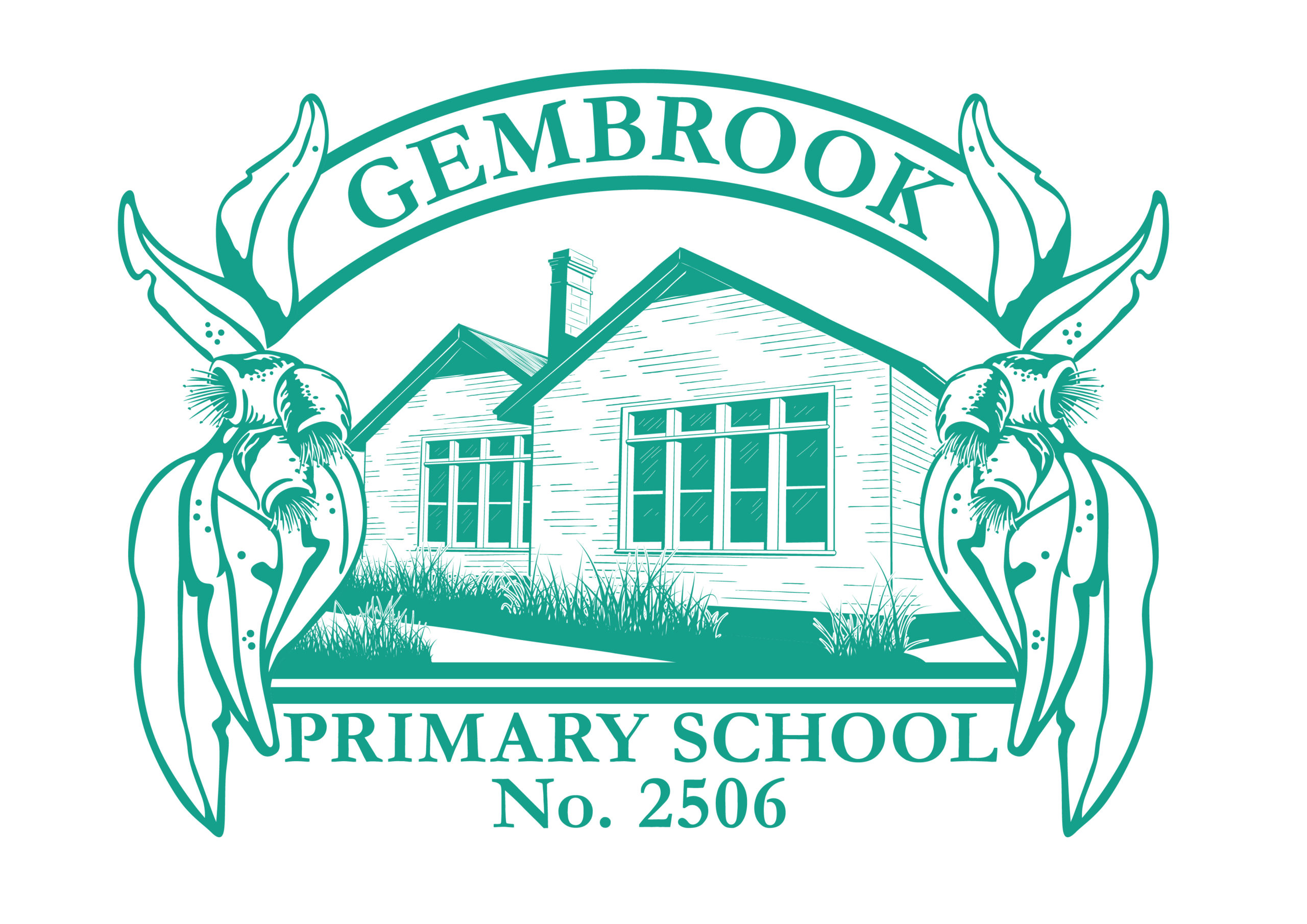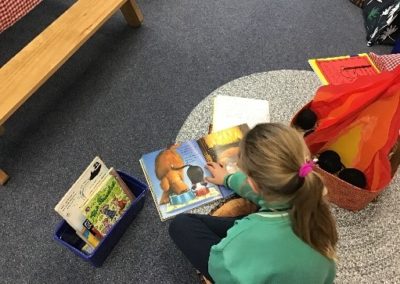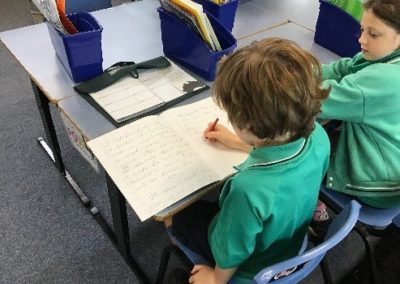LITERACY at Gembrook Primary School
Literacy at Gembrook Primary School is a whole school experience. We approach literacy planning and explicit teaching with the Victorian Curriculum (Reading & Viewing, Writing, and Speaking & Listening), and the Workshop and Instructional Models at the forefront, followed by exceptional planning of engaging and explicit teaching, and students having the opportunity to explore a variety of genres. Reading and writing are closely linked across the year, students will discover and learn the craft of imaginative, informative and persuasive reading and writing. Students are exposed to and are engaged in units of Narrative, Poetry, Author Study, Speeches, Informative and Persuasive reading and writing. Spelling is encompassed throughout the literacy lessons, as well as, having standalone lessons based on the five areas of spelling; phonological knowledge (aware of the sounds of letters), visual knowledge (how words look), orthographical knowledge (knowing which letters go together in words), morphological knowledge (identifying parts of words) and etymological knowledge (where words originate from). Speaking and Listening is practised across all areas of the curriculum. This is where students are able to apply their knowledge verbally (independently, in small groups or to the whole class), respond and engage in conversations with each other respectfully, actively listen to their peers and the teacher, and express their views and opinions in a caring and safe environment. Each day students will have a reading, writing and word work (spelling, vocabulary, phonics, handwriting) lesson.
READING & VIEWING
Reading and Viewing involves students understanding, interpreting, critically analysing, reflecting upon, and enjoying written and visual, print and non-print texts. It encompasses reading and viewing a wide range of texts and media, including literary texts. Reading involves active engagement with texts and the development of knowledge about the relationship between them and the contexts in which they are created. It also involves the development of knowledge about a range of strategies for reading. (VCAA, English Curriculum).
At Gembrook Primary School, reading is our first academic priority, as every students requires reading to be successful across the whole curriculum, particularly writing. Students are exposed to learning print concepts, phonemic awareness, decoding, word accuracy, word fluency, expression, word morphology, and comprehension.
Every student has an individualised reading goal, which is monitored and analysed by the student and class teacher in a conference. Comprehension strategies (activating prior knowledge, making connections, visualising, predicting, inferring, questioning, summarising, synthesising and critically thinking) are taught across every year level and students use their reader’s notebook to track their thinking and understanding of the books they read.
All students at Gembrook Primary School participate in a reading lesson which includes opportunity to independently read every day. Each daily reading lesson has an explicitly taught component using exemplar mentor texts, plenty of opportunity to practise their reading and apply their new learning, as well as debrief (share and reflect) with their peers and teacher. Students have opportunities to work independently, in small groups or as a whole class, with at least once a fortnight 1:1 conference with their teacher. There are a variety of reading practices a teacher will implement to provide the most appropriate format for the lesson; independent reading, shared reading, modelled reading, guided reading, literature circles (book club), and reading conferences.
Students read at different levels and this is why students are encouraged to read “just right” books, ensuring they are able to read accurately, read with fluency and are able to understand what they are reading. This is discussed at their weekly 1:1 conference with the teacher. We encourage students to record the nights of reading they complete, either on their own or with a parent/carer. We place value on celebrating reading achievements through weekly academic reading awards at assembly and we reward those students with certificates for reading regularly at home, with the high achieving reward being a 300 night pin.
WRITING
Learning to write is a complex process encompassing cognitive, physical, social and cultural dimensions. Writing, as a mode of English in the Victorian Curriculum, is an integral part of learning in all disciplines requiring students to write or compose a diverse range of texts that meet the literacy demands specific to the various curriculum or discipline areas. Texts produced, and interpreted, might be print based or multimodal. In the composition of modally complex texts, ‘writing is one of several modes of representations’. As such, students need to be taught a range of skills and meaning-making codes to compose texts (VCAA, English Curriculum).
At Gembrook Primary School, reading and writing are closely linked, working together in the study of a genre to demonstrate the connection between author (writer) and audience (reader). The writing process follows the writing cycle;
- Planning and rehearsing: the generation, selection and sorting of ideas to write about, consideration of purpose and audience which will influence genre selection and organisation.
- Drafting or composing: the recording of ideas with attention to meaning making, grammar, spelling, punctuation and handwriting (or keyboarding).
- Revising: the revisiting of the text (often as a result of feedback from peers and/or the teacher) to improve and enhance the writing.
- Editing and proofreading: the polishing of the draft in readiness for publication, which includes editing for spelling, text layout, grammar, capitalisation and punctuation.
- Publishing: the preparation of the text for sharing with an audience, with attention given to the form and style of the text.
With this writing process in mind, Gembrook Primary School then use the 6 + 1 Traits of Writing to ensure students understand the process of writing in a student friendly and explicit way.
The 6 + 1 Traits of Writing are;
- Ideas
- Organisation
- Word Choice
- Sentence Fluency
- Voice
- Conventions
+ 1 Presentation
Students need to write with purpose and have an authentic audience in mind. Explicit teaching is vital to support students going through the process with focussed and scaffolded writing experiences. It is important for students to collaborate (engage in peer conferences) at all phases of the writing process, provide and receive feedback, and be exposed to rich authentic mentor and modelled text.
At the conclusion of each unit of study, students will have created a writing piece to be proud of; a poetry anthology, a picture story book, or an informative presentation. We celebrate writing at Gembrook Primary School, both at the conclusion of a unit of study and a weekly academic writing award presented at our assembly to a student who has fulfilled the high expectations of writing at our school. Students also have the opportunity to share their writing at assembly or display it in our writing display window.
SPEAKING & LISTENING
Speaking and Listening refers to the various formal and informal ways oral language is used to convey and receive meaning. It involves the development and demonstration of knowledge about the appropriate oral language for particular audiences and occasions, including body language and voice. It also involves the development of active-listening strategies and an understanding of the conventions of different spoken texts; a part of the English Curriculum (VCAA, English Curriculum).
At Gembrook Primary School, Speaking and Listening is not a standalone area of the curriculum, it is integrated through all areas of learning, but is reported on in the English Curriculum. It involves the understanding of oral language, expressive language and receptive language. The following assists the understanding of what needs to be explicitly taught by the teachers and what needs to be understood by the students;
- Listen to and respond orally to texts and to the communication of others in informal and structured classroom situations using interaction skills, including listening, while others speak (VCELY174)
- Understand that spoken, visual and written forms of language are different modes of communication with different features and their use varies according to the audience, purpose, context and cultural background (VCELA234)
- Understand that successful cooperation with others depends on shared use of social conventions, including turn-taking patterns, and forms of address that vary according to the degree of formality in social situations (VCELA271)
- Understand how texts vary in purpose, structure and topic as well as the degree of formality (VCELA309)
- Understand that strategies for interaction become more complex and demanding as levels of formality and social distance increase (VCELA363)
SPELLING
At Gembrook Primary School, spelling is not a program, rather a philosophy and understanding that to be an exemplary speller, you need to understand the 5 areas of spelling;
- Visual Knowledge; knowledge of how letters and words look.
- Phonological Knowledge; knowledge of the sound structure of language.
- Orthographical Knowledge; knowledge of the system of written symbols used to represent spoken language.
- Morphological Knowledge; knowledge of the smallest parts of words that carry meaning.
- Etymological Knowledge; knowledge of the origin of words and language.
We then take these 5 areas of spelling and create strategies;
- The Visual Strategy; using Visual and Orthographical Knowledge, thinking about the letter patterns in words.
- The Sound Strategy; using Phonological Knowledge, say the words slowly, what are the sounds being made?
- The Meaning Strategy; using Morphological and Etymological Knowledge, what do the words mean, does it have a prefix or suffix?
- The Connecting Strategy; is the word connected to another word through meaning, sound, and letter patterns?
- The Checking Strategy; check with a spelling buddy, word walls, charts, teacher, dictionary, or internet.
Spelling is taught explicitly at Gembrook Primary School through explicit mini lessons. Inquiry, individual practise and peer support. Each area is taught so students find their way that best suits them to spell words, this is why spelling programs never work. If it does not work one way, students will have the knowledge to try another way to discover the joy of words and language.
LITERACY AT HOME
We encourage parents/carers to continue reading with their child at home, see the below links for further guidance;
PREP-2
https://www.education.vic.gov.au/parents/learning/Pages/literacy-birth-years-2.aspx
Year3-6
https://www.education.vic.gov.au/parents/learning/Pages/literacy-years-3-6.aspx
If you wish to discuss your child’s reading, writing or spelling, please do not hesitate to contact your child’s teacher or the school.


